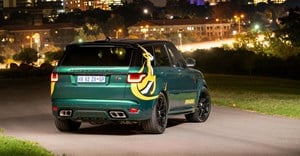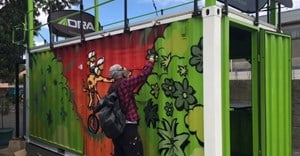
Green Goal provides day, night interest
Part of this programme is the Green Goal 2010 Expo, being held at the Fan Fest on the Grand Parade in Cape Town throughout the 2010 FIFA World Cup. The expo stand is constructed entirely from materials that are recycled, reusable, reclaimed, or newly purchased but earmarked for reuse.
The exterior is clad in a matrix of 1450 multicoloured plastic milk crates containing 17 400 empty milk bottles. Low energy lighting illuminates the crates from behind turning it into a glowing jewel box by night. Local references to indigenous plants, Fynbos smells, colours and quiet spaces, subtly entice visitors to connect with the natural world inside. A forest of bamboo flags wave in the wind, announcing the exhibition from afar.
"The programme contributes to environmental awareness, waste minimisation, efficient energy use, sustainable water consumption, compensation for the event's carbon footprint, responsible tourism, and green building, which takes future generations into account when building structures such as the Cape Town Stadium," comments Gottleib Arendse, director: Waste Management, Department of Environmental Affairs & Development Planning, Western Cape.
"Some of these environmentally friendly interventions can be seen at the FIFA Fan Fest. For example, fans are encouraged to separate wet and dry waste in the two-bin system along the Fan Walk and at the Cape Town Stadium. There will be no disposable cups or plates, so fans buying refreshments at the Fan Fest will be sold commemorative 2010 mugs and food will be served on durable plates."
The drinking of tap water will also be promoted as part of the Green Goal 2010 programme, thus reducing waste. Drinking water fountains have been erected at the Fan Fest and along the Fan Walk, and videos promoting the fact that the city's tap water is safe to drink, will be shown on the big screens at the Fan Fest throughout the tournament.
Other environmental interventions
Buying electricity from the wind farm in Darling at a separate tariff will compensate for the energy used at the FIFA Fan Fest.
Arendse said that the Green Goal programme also included an eco-driving training module for metered taxi drivers in Cape Town, in partnership with the South African Petroleum Industry Association (SAPIA). "Driving eco-consciously, reduces fuel consumption, air pollution and saves money."
"South Africa is a long-haul destination and will have an estimated carbon footprint of more than eight times that of Germany in 2006," says Dr Laurine Platzky, 2010 FIFA World Cup coordinator, Department of the Premier of the Western Cape. "Carbon emissions during the 2010 event will remain one of the biggest environmental challenges for Cape Town and projects aimed at reducing carbon emissions such as the installation of energy-efficient floodlights and electricity sub-meters at Philippi Stadium and equipping low-income households with solar water heaters, will ensure that the event is a low carbon one."
More information on the programme go to www.capetown.gov.za/en/GreenGoal/Pages/default_old.aspx
















